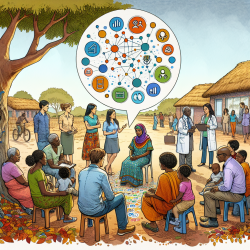Introduction
As practitioners in the field of speech language pathology, our primary goal is to create optimal outcomes for children. However, we can also draw valuable insights from broader public health initiatives that focus on community-based interventions. One such initiative is the Meta Salud program, a community health worker–facilitated intervention aimed at preventing chronic diseases in Hermosillo, Sonora, Mexico. This program was adapted from Pasos Adelante, an evidence-based intervention developed for the Latino population in the United States–Mexico border region.
Research Findings
The research article "Evaluation of the Community-Based Chronic Disease Prevention Program Meta Salud in Northern Mexico, 2011–2012" provides a comprehensive analysis of the outcomes of this program. The study involved a pretest–posttest design over 13 weeks, targeting low-income urban residents. It focused on improving heart health, physical activity, nutrition, diabetes management, and emotional well-being through individual and group activities.
Key findings from the study include significant reductions in body mass index (BMI), waist and hip circumference, weight, triglycerides, and low-density lipoprotein (LDL) cholesterol. Additionally, there was an increase in high-density lipoprotein (HDL) cholesterol from baseline to a 3-month follow-up. These outcomes were comparable to those observed in the Pasos Adelante program, suggesting the scalability and effectiveness of such interventions across similar cultural and linguistic contexts.
Implications for Practitioners
For practitioners in speech language pathology, the Meta Salud program offers several takeaways:
- Community Engagement: The success of Meta Salud underscores the importance of engaging community health workers (CHWs) to facilitate interventions. This approach can be adapted to speech therapy by involving local educators and community leaders to promote speech and language development in children.
- Behavioral Interventions: The program's focus on behavior change through participative methods can be mirrored in speech therapy sessions. Encouraging children to actively participate in their therapy can enhance motivation and outcomes.
- Data-Driven Decisions: The use of pretest–posttest data in Meta Salud highlights the importance of measuring outcomes. Practitioners should consistently evaluate the effectiveness of their interventions to make informed adjustments.
Encouraging Further Research
While the Meta Salud program provides a robust framework for chronic disease prevention, it also opens avenues for further research. Practitioners are encouraged to explore:
- The applicability of community-based interventions in different socio-environmental contexts.
- The integration of technology in facilitating remote interventions, similar to the services provided by TinyEYE.
- The long-term sustainability and scalability of such programs in diverse populations.
Conclusion
The Meta Salud program offers valuable insights into community-based health interventions. By implementing similar strategies, speech language pathologists can enhance the effectiveness of their practice, ultimately leading to better outcomes for children. To read the original research paper, please follow this link: Evaluation of the Community-Based Chronic Disease Prevention Program Meta Salud in Northern Mexico, 2011–2012.










